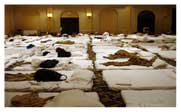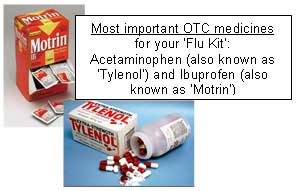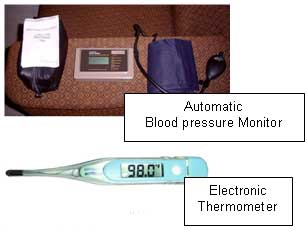Why This is Important
Despite your efforts to stay healthy, you or a member of your family may become infected. Current pandemic plans from the Department of Health and Human Services identify three treatment options. If the healthcare system is overwhelmed, these will likely be reduced to one.
- Hospitals Hospitals are already understaffed, while operating at nearly full capacity. In a pandemic, hospital patient load increases while healthcare workers will be absent because they are also getting sick. Doctor's offices and clinics will also experience staff illnesses.

- Alternate healthcare facilities Local health departments and districts are working with hospitals to identify alternate facilities that can be dedicated to mass flu treatment. Examples are schools, convention centers, and motels. The level of care will not be that of a hospital. These facilities may also become overcrowded. Additionally, they are a potential source of infection just like any mass gathering.

- Home treatment The third option. This is the most likely option for people during a severe pandemic. This option also provides the most time spent with the ill person by a caregiver.
Considerations for Home Treatment of Influenza
1. Checking with your own medical practitioner and the public health department in your own area is the best place to start. The next section has some guidelines for home treatment to provide a starting point for these discussions.
2. People who develop flu symptoms should rest and start treatment (including fluids) early, and plan on avoiding others where possible. Early use of antiviral medication, if available, should be considered within 48 hours of symptoms (speak to your doctor or health department).
3. Preventing or treating dehydration in people with the flu will save more lives than any other intervention during an influenza pandemic. This is done with an oral re-hydration solution, described in ‘Good Home Treatment of Influenza’ (see next section). Check with your medical practitioner for any prescription medications that you may need and buy basic over the counter medications to treat the flu at home.
4. Creating a “sick room” near or within your house is an important measure to reduce exposure to other family members (see Treating the Flu – Isolation and Infection Control).
Getting Help Guidelines
Again, checking with your own medical practitioner and the public health department in your own area for available resources is the best place to start.
Detailed guidance on home care includes:  The following documents provide abbreviated guidance on home care:
The following documents provide abbreviated guidance on home care: All of the above SHOULD be printed out prior to an influenza outbreak and kept in a notebook. They are not meant as a substitute for medical advice from your own medical practitioner where available, so start there if you can.
Over the Counter Medications

NOTE: The following is extracted from “Influenza Pandemic Preparation and Response: A Citizen’s Guide,” by the Mid-Peninsula Citizen’s Preparedness Committee.
Providing comfort care to family members and friends sick with influenza is a task that will be easier with a good supply of specific over-the-counter medications, some medical equipment, and a few items from the grocery or hardware store. Acetaminophen and ibuprofen for fever control are the most important OTC medicines to have on hand.
NOTE: aspirin is not recommended for children under 19 years old with flu symptoms because of the risk of Reye’s syndrome.
What to Have on Hand for Home Treatment of One Person with Severe Influenza
If you have more than one person in your household, multiply the amounts suggested by the number of people. For example for a household with 4 people, have 4 pounds of table salt available.
- Table salt: 1 lb
- Table sugar: 10 lbs

- Baking soda: 6 oz
- Household bleach: 1 gallon
- Tums Ex: 500 tablets
- Acetaminophen 500 mg: 100 tablets
- Ibuprofen 200 mg: 100 tablets
- Caffeinated tea: 1 lb
- Electronic thermometer
- Automatic blood pressure monitor
- Notebook for recording vital signs and fluid intake and output
- Kitchen measuring cup with 500 cc (two cup) capacity
- Diphenhydramine (Benadryl) 25 mg: 60 capsules
- Anti-diarrheal medication
The above is not meant as a substitute for medical advice from your own medical practitioner where available, so start there if you can.